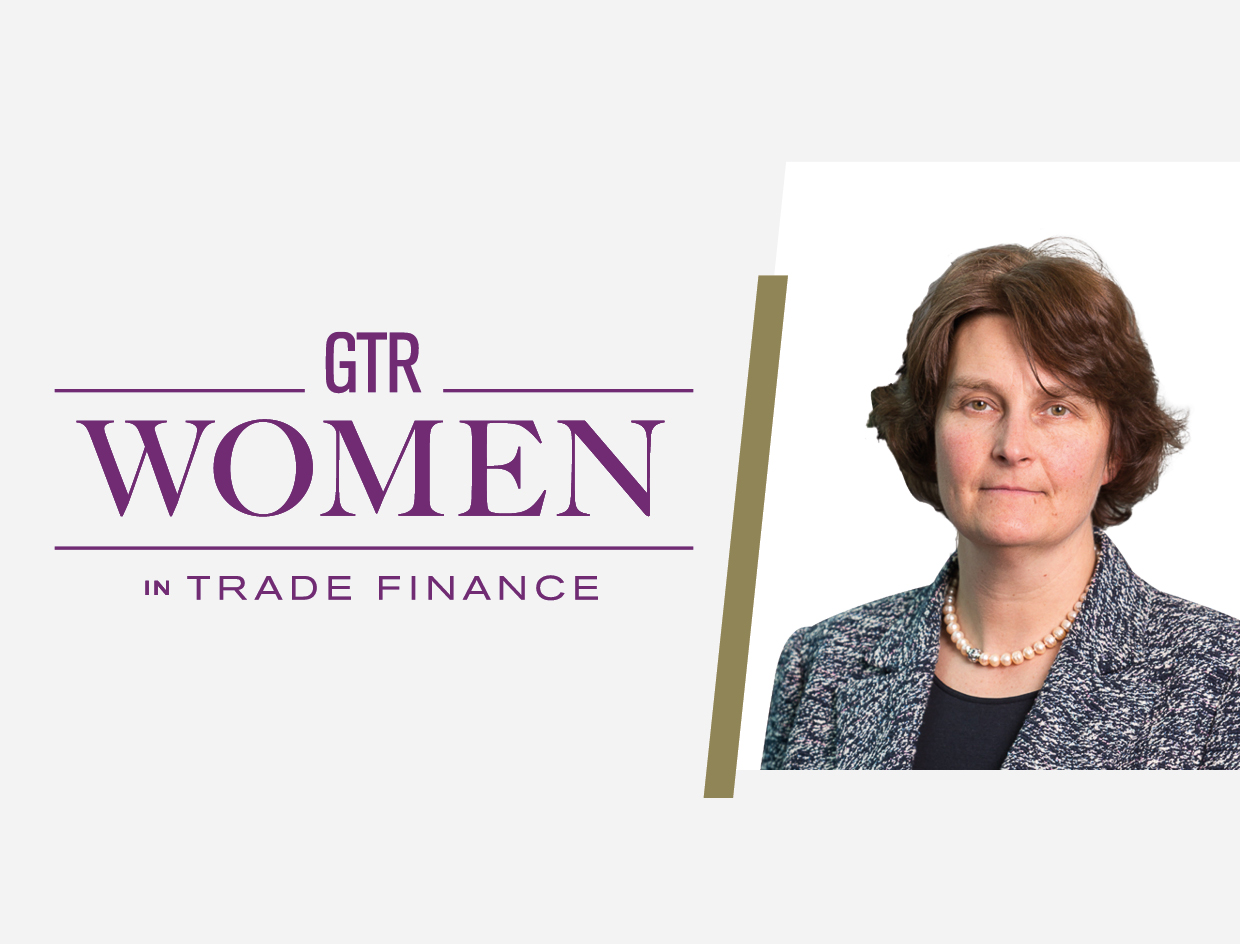She is one of the highest ranked females at HSBC, and the journey to the top has made her more adamant to fight gender bias. In the first episode of GTR’s new series about inspirational women in trade finance, Sanne Wass speaks to HSBC’s head of global trade finance Natalie Blyth.
“I wouldn’t at all classify myself as somebody who is brimming over the edges with confidence.” In fact, for Blyth, when she was a junior banker, it was about keeping a low profile and doing a good job. “It’s over the years that confidence builds up. Being the colour of the wall isn’t going to be enough, you need to stand up for yourself.”
A 45-minute interview is a tight schedule for the 51-year-old mother-of-four to tell the story of how she went from being an aspiring vet to taking up a high-ranking role at HSBC.
Blyth grew up with an old-fashioned father, who had high ambitions for his son, her brother. But her mother was always adamant that Natalie should be financially independent. “Be courageous,” they told her. “That’s been with me since I can remember. I do think that for women in this industry, you have to be brave and take opportunities when they come your way.”
That was exactly what Blyth did. Studying biochemistry at St Andrews University in Scotland, she had never stepped foot in the City of London until the age of 21 when, by chance, she ended up there doing a summer vacation scheme at a law firm.
“I was totally seduced,” she says. Blyth soon realised she wanted to be a banker. Her first job was at Kleinwort Benson, where she spent 11 years. It was also the period in which she had her four children.
Blyth remembers the bank as being a good place for a woman, but she also learned important lessons about the fight for gender equality.
To prove a point and to be true to the moral standards she had set for herself, she only took four weeks of leave after having her first child. “I definitely regret that,” she says. “It was too short a time. I had promised to come back at a certain date, having no idea really what I was embracing.”
Female advisors only
It was also early on at Kleinwort that she had one of her first big career breakthroughs when she – together with other bankers – advised a multinational company on a joint deal in the US. The client had decided to only allow female advisors on the deal, and being the only woman in the team, Blyth was given a unique opportunity.
“They were militant about the wish to promote women. So the guys had to wait outside the meeting room until I came back and shared what had gone on,” she smiles.
“To begin with I thought it was freaky to have this extraordinary sisterhood. But when I look back on it, there is absolutely no question it was a major break for me. It helped shape and inform who I am and what I have done, and therefore what I am prepared to do for women also coming up the pipe. It’s a very courageous thing to do.”
Since then, gender balance has been an important consideration for Blyth when hiring, promoting, rating and giving raises. She also mentors female staff.
If you had asked me 10 years ago if I believed in quotas, the answer would be no, we have to do it on merit.
She says she wants to put an end to the subconscious bias towards promoting men that exists in banking today. “Promoting a woman into a senior role has much more spotlight on it. And the individual who promoted the woman is absolutely tied at the hip to the decision. If it doesn’t work out, they get criticised. Their integrity is under much more scrutiny,” she says, adding that sometimes more extreme measures are needed.
“If you had asked me 10 years ago if I believed in quotas, the answer would be absolutely no, because we have to do it on merit. But I am so fed up at the pace of change being so slow. And I have also personally benefited from people taking a risk on me.”
From Kleinwort, Blyth moved to Deutsche Bank for three years, before joining HSBC in 2007.
Still today, she benefits from people taking risks on her. This is what she calls her ‘sponsors’ – people who sometimes know her better than herself and are there to push her when she is “stuck”.
“The biggest piece of advice I have got for women out there is to get a sponsor,” she says. “You will already have them; you just might not know it.”
Outside of banking, Blyth keeps bees in her garden. When she is retired, she wants to write a book about bees and banking: about the lessons she has learned from bees and how they are applicable to the industry.
Although late for her next meeting, Blyth struggles to keep it short when passionately answering the question of how bees and banking could possibly have anything to do with each other – an answer the readers of this article will have to wait for until the book comes out. But it might be a while, because retirement, Blyth says, is not something she is ready for. “I’m having too much fun,” she says.
More articles in GTR’s Women in Trade Finance series:
Lorna Pillow: “There are no superwomen; there are only women who have support”
Emma Clark: “No one tells you that trade finance can be really fun”
Sian Aspinall: “We owe it to the next generation”







